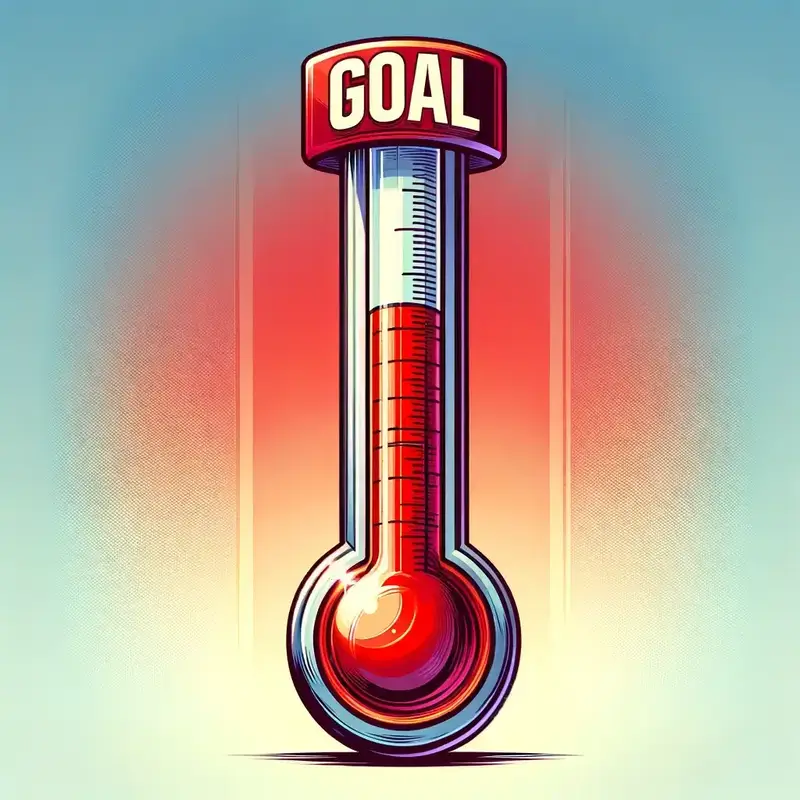Focusing on short term career goals will be a game-changer in your professional journey or even in personal objectives. It’s about setting achievable goals in a short period that will allow you to complete your long-term objectives.
Let’s see those short-period goals. What they are and how you can create yours, to understand why they are so crucial in your path to achieving the long-period goals.
Understanding Short Term Career Goals
Let’s start with a quick introduction in what those goals are and the different types of them.
What are Short Term Career Goals
They are specific, immediate targets that are achievable within a relatively short timeframe, often ranging from a few months to a couple of years. Setting these goals helps maintain focus, measures progress, and can greatly contribute to job satisfaction and career advancement.
By understanding and effectively setting short-term goals, you can create a clear path for growth and development in your career.
Their Benefits and Why you Should Implement Them
These goals are important because they provide a clear roadmap for personal and professional development. They act as benchmarks for progress, helping you to stay focused and motivated while working on your larger career objectives.
Here are the benefits that we found using this method to set objectives for 3 years:
- Provides Clear Direction: Short-term goals offer a clear roadmap of what you need to do shortly, reducing uncertainty and helping you focus your efforts effectively. Your daily actions will be attached to your final objective.
- Improves Motivation and Commitment: The achievement of short term goals keeps you motivated and committed to your career. Completing them provides a sense of accomplishment and pushes you to move forward.
- Facilitates Skill Development: They allow you to focus on developing specific skills relevant to your career, ensuring continuous professional growth and adaptability to the fast-evolving market.
- Boosts Performance and Productivity: With clear, short term objectives, you can calculate your progress more effectively, helping to boost general performance. Also, they allow you to use your time and resources more efficiently, focusing on what’s most important right now.
- Improves Professional Visibility and Opportunities: Completing short term goals can lead to recognition from your peers and superiors, improving your professional reputation. Regular accomplishments can make you a great candidate for promotions or better job opportunities.
- Supports Personal Development: Each achieved goal adds to your self-confidence, affirming your ability to meet challenges. As long as you achieve your goals, it will reduce your anxiety and stress related to your career.
- Enhances Adaptability and Flexibility: This will allow you to adapt to changes in your job or industry quickly. They are easier to modify if you get new information that could affect your final goal.
"Dream big dreams, but never forget that realistic short-term goals are the keys to your success "
 Matt Biondi
Matt Biondi Examples of Short Term Career Goal Types
Let’s explore various types of short-term career goals that you can implement to achieve your ambitions, fostering continuous growth and development in the ever-evolving landscape of your chosen field.
Also, we will explore for different examples of type so you can have a path to start implementing your own goals.
Skill Enhancement Goals
Enhancing skills ensures professional relevance, adaptability, and increased competency, making individuals more valuable assets to their employers and the industry.
| Goal | Example |
|---|---|
| Programming Proficiency | Improve proficiency in Python programming by completing an advanced online course within the next three months. |
| Graphic Design Mastery | Enhance graphic design skills by attending a specialized workshop on Adobe Creative Suite, focusing on advanced techniques and applications, within the next two months. |
| Data Analysis Skills | Develop expertise in data analysis by completing a hands-on training program in statistical software and methodologies within the next six weeks. |
| Effective Communication | Strengthen communication skills by enrolling in a public speaking course or workshop to confidently present ideas and engage with diverse audiences within the next four months. |
| Foreign Language Proficiency | Acquire conversational proficiency in Spanish by dedicating 30 minutes daily to language learning apps and participating in language exchange sessions over the next three months. |
Certification Attainment Goals
Achieving certifications validates expertise, enhances credibility, and opens up opportunities for career advancement and increased earning potential.
| Goal | Example |
|---|---|
| Project Management Professional | Attain the Project Management Professional (PMP) certification within the next six months by completing a comprehensive exam preparation course. |
| Certified Digital Marketing Professional | Obtain the Certified Digital Marketing Professional (CDMP) certification within the next year by successfully completing an accredited digital marketing certification program. |
| Cisco Certified Network Associate | Achieve the Cisco Certified Network Associate (CCNA) certification within the next eight months through focused study, practical labs, and exam preparation. |
| Certified ScrumMaster | Obtain the Certified ScrumMaster (CSM) certification within the next four months by attending a Scrum Alliance-approved training program and passing the certification exam. |
| Human Resources Certification | Earn a recognized Human Resources certification, such as the Society for Human Resource Management (SHRM) certification, within the next nine months through a combination of coursework and exam preparation. |
Networking Goals
Building a robust professional network facilitates knowledge exchange, mentorship, and potential career opportunities through referrals and connections.
| Goal | Example |
|---|---|
| Industry Conference Attendance | Attend at least two major industry conferences within the next year to expand professional connections, stay updated on industry trends, and engage with experts in the field. |
| Online Networking Webinars | Participate in a minimum of four online networking webinars over the next six months to connect with professionals globally and gain insights into emerging technologies and practices. |
| Local Meetup Engagement | Actively participate in local professional meetups or networking events at least once a month to build a strong local network and foster relationships with professionals in the community. |
| LinkedIn Outreach | Connect with at least 20 new professionals in the industry on LinkedIn each month to expand the online professional network and facilitate potential collaboration or job opportunities. |
| Mentorship Seeking | Identify and approach at least two potential mentors within the next three months, seeking guidance and insights to enhance professional development and navigate career challenges effectively. |
Project Completion Goals
Successfully leading projects demonstrates leadership and project management capabilities, contributing to career advancement and showcasing reliability in handling responsibilities.
| Goal | Example |
|---|---|
| Software Development Project | Lead a cross-functional team to successfully complete a software development project, delivering a functional product within the specified timeline and meeting quality standards. |
| Marketing Campaign Launch | Execute and launch a comprehensive marketing campaign, from planning to implementation, within the next three months, driving increased brand visibility and engagement. |
| Process Optimization Initiative | Implement a process optimization initiative within the department, streamlining workflows and improving efficiency, and demonstrate measurable improvements within the next four months. |
| Product Launch | Oversee the successful launch of a new product, coordinating with various departments, managing timelines, and ensuring a seamless market entry within the next six weeks. |
| Event Coordination | Plan and execute a company-wide event, managing logistics, coordinating vendors, and ensuring a positive experience for attendees within the next two months. |

Performance Improvement Goals
Improving personal performance enhances productivity, efficiency, and overall contributions to the organization, positioning individuals for recognition and career progression.
| Goal | Example |
|---|---|
| Time Management Enhancement | Improve time management skills by implementing effective time-tracking techniques and prioritizing tasks, aiming to increase overall productivity by 15% within the next quarter. |
| Quality Output Increase | Enhance the quality of work by implementing feedback received during performance reviews, with a goal to consistently achieve a 10% improvement in project deliverable quality over the next three months. |
| Professional Development Engagement | Actively engage in at least two professional development opportunities each month, such as workshops or online courses, to acquire new skills and knowledge, contributing to improved job performance. |
| Client Satisfaction Improvement | Increase client satisfaction by 20% within the next six months through enhanced communication, proactive problem-solving, and delivering solutions that meet or exceed client expectations. |
| Team Collaboration Enhancement | Strengthen team collaboration by actively participating in cross-functional projects, fostering open communication, and resolving conflicts efficiently, with the aim of improving overall team performance by 15% in the next quarter. |
Training and Development Goals
Continuous learning through workshops or webinars ensures staying updated on industry trends, fostering professional growth, and maintaining a competitive edge.
| Goal | Example |
|---|---|
| Leadership Training | Enroll in a leadership development program to enhance leadership skills, focusing on effective communication, decision-making, and team management within the next six months. |
| Technical Skills Advancement | Attend specialized technical training sessions or workshops to acquire advanced skills in emerging technologies relevant to the industry, ensuring continuous professional development over the next year. |
| Certification Pursuit | Pursue and obtain a relevant professional certification within the next nine months, demonstrating commitment to continuous learning and skill validation in the chosen field. |
| Soft Skills Development | Participate in workshops or courses focused on soft skills such as emotional intelligence, interpersonal communication, and adaptability, aiming to improve overall workplace effectiveness within the next four months. |
| Industry Trends Awareness | Regularly attend webinars, conferences, or read industry publications to stay updated on the latest trends and innovations, fostering a proactive approach to staying current within the next three months. |
Mentorship Goals
Establishing mentorship relationships provides valuable guidance, insights, and career advice, accelerating professional development and helping navigate challenges.
| Goal | Example |
|---|---|
| Establishing Mentor Relationships | Identify and establish mentorship relationships with at least two experienced professionals in the industry within the next three months to gain valuable insights and guidance. |
| Regular Mentor Meetings | Schedule regular mentorship meetings, whether virtual or in-person, at least once a month to discuss career progress, seek advice on challenges, and receive feedback on professional development. |
| Skill-Specific Mentorship | Seek mentorship from a professional known for expertise in a specific skill or area, aiming to enhance proficiency in that skill and gain specialized knowledge within the next six months. |
| Cross-Functional Mentorship | Establish mentorship relationships with professionals from different departments or industries to gain diverse perspectives and insights, fostering a broader understanding of the business landscape within the next year. |
| Reciprocal Mentorship | Offer reciprocal mentorship to a junior colleague or someone with less experience in a specific area, creating a mutually beneficial mentorship dynamic and contributing to the development of others within the next four months. |
Cross-Functional Collaboration Goals
Collaborating across departments fosters a holistic understanding of the organization, promotes versatility, and opens avenues for diverse experiences and skill acquisition.
| Goal | Example |
|---|---|
| Interdepartmental Project Leadership | Take a leadership role in an interdepartmental project within the next six months, fostering collaboration among diverse teams and contributing to a successful project outcome. |
| Knowledge Sharing Workshops | Organize and facilitate knowledge-sharing workshops between departments to enhance understanding of each team’s roles and responsibilities, promoting a culture of collaboration within the next quarter. |
| Cross-Training Initiative | Initiate a cross-training program where team members from different departments exchange skills and knowledge, fostering a more versatile and interconnected workforce within the next five months. |
| Joint Innovation Project | Collaborate with members from various departments on an innovative project, aiming to leverage diverse perspectives and skills to drive creative solutions and advancements within the next eight months. |
| Shared Decision-Making Task Force | Establish a cross-functional task force for decision-making on organizational initiatives, ensuring representation from different departments to enhance inclusivity and effectiveness within the next year. |

Goal Setting and Planning
Creating a career plan with clear goals and timelines cultivates a sense of purpose, direction, and motivation, guiding individuals towards their desired professional outcomes.
| Goal | Example |
|---|---|
| Career Milestone Roadmap | Develop a comprehensive roadmap outlining specific career milestones, including skill acquisitions, promotions, and certifications, for the next five years to provide a clear trajectory for professional growth. |
| SMART Goal Implementation | Implement SMART (Specific, Measurable, Achievable, Relevant, Time-bound) goals for all projects and tasks over the next quarter to enhance clarity, accountability, and overall goal achievement. |
| Personal Development Plan | Create a personal development plan with short-term and long-term goals, incorporating both professional and personal aspirations, to ensure a balanced and holistic approach to life and career within the next month. |
| Quarterly Performance Review Preparation | Establish a routine for quarterly performance review preparation, including self-assessment and goal alignment, to ensure continuous improvement and effective communication with supervisors within the next two weeks. |
| Feedback Integration Strategy | Develop a strategy for actively seeking and integrating feedback from colleagues, mentors, and supervisors into future goal-setting processes, fostering a continuous feedback loop for improvement within the next month. |
Feedback and Performance Review Goals
Seeking feedback actively fosters self-awareness, highlights areas for improvement, and contributes to continuous professional development, ultimately leading to enhanced performance and career success.
| Goal | Example |
|---|---|
| 360-Degree Feedback Solicitation | Implement a 360-degree feedback mechanism, actively seeking input from colleagues, subordinates, and supervisors, to gain a comprehensive understanding of strengths and areas for improvement during the next performance review cycle. |
| Skill-Specific Improvement Plan | Based on feedback received, create a targeted improvement plan to enhance specific skills identified during the performance review, with a goal to demonstrate measurable progress within the next three months. |
| Regular Check-ins with Supervisor | Schedule regular check-ins with the supervisor between formal performance reviews to discuss progress, address concerns, and align goals, promoting ongoing communication and collaboration. |
| Professional Development Goal Alignment | Align performance review feedback with professional development goals, ensuring that identified areas for improvement are addressed through relevant training, workshops, or mentorship within the next six months. |
| Quantifiable Goal Setting | Set quantifiable goals for the next performance review cycle, focusing on specific achievements and contributions that can be measured objectively to demonstrate concrete progress and impact. |
Step-by-Step Guide Creating the Short Term Career Goals
Here is a guide in which you can be based to create your own set of short term goals to achieve your final goal.
1. Understand Your Long-Term Objectives
Start by evaluating your long term career goals. What are you planning to achieve in the next five years or more? Short term goals should act as grains of sand for that big mountain.
2. Choose Specific Areas to Focus On
Identify specific skills you need to improve or problems you need to solve to reach bigger goals. It could be technical skills, leadership or soft abilities, or personal issues that distract you.
3. Set SMART Goals
- Specific: Be as specific as possible with your goals. For instance, “improve my sales skills” is unclear, but “complete an advanced sales training course” is more specific.
- Measurable: Ensure that your goal is measurable so you can track your progress. For example, “increase my typing speed to 60 words per minute”.
- Achievable: Your goals should be realistic and achievable within your current resources and time limitations.
- Relevant: Ensure the goal is relevant to your career path and, of course, to your long term objectives.
- Time-Bound: Set a clear deadline. A time limitation creates urgency and provokes action.
4. Develop an Action Plan
Break your goal into manageable tasks. Those tasks will make the goal more manageable and more accessible to tackle. Also, determine your resources: courses, mentors, books, or time for practice and study.
5. Monitor Your Progress
Set aside time regularly to review your progress. This process can be weekly or monthly, depending on the goal and the difficulty. Also, you must be prepared to adjust your plan if you encounter obstacles or circumstances change.
Lastly, you can review your process to see if you achieve your goal. What worked well? What could be improved? Use these questions to refine your approach to future goals.
Real-Life Example of a Short Term Career Goals
Now that we have seen the steps to create those goals, let’s see a real scenario example so you can be more oriented to create your own short term goals.
Lucas just joined a tech company as a junior developer. Still, he has seen how the Developer Leader manages the team to achieve the objectives, assigning each developer a different task. Lucas is excited about that position and wants to become a Developer Leader.

1. Understand Your Long-Term Objectives
Lucas desires to be a developer leader, a role that demands technical expertise, leadership skills, and a strong understanding of project management. As a junior developer, he must improve his technical skills, understand the company’s culture, and develop leadership qualities.
2. Choose Specific Areas to Focus On
Start learning about specific programming languages or technologies used within the company and develop skills in working effectively within a team.
3. Set SMART Goals
Here, we have different SMART Goals that he will need to create.
Technical Skill
- Specific: Learn and create a personal project using the ReactJS framework for web development within the next four months.
- Measurable: Finish the course about the bases of ReactJS.
- Achievable: Considering Lucas’s background, the resources available at the company, and the online information.
- Relevant: ReactJS is the most common framework in the company’s projects.
- Time-Bound: Four months to master and apply the skill.
Collaboration and Teamwork
- Specific: Participate in all team meetings and contribute ideas to the following three projects.
- Measurable: Feedback from team leads and peers.
- Achievable: Requires active attention and participation but no formal leading.
- Relevant: Teamwork is crucial for career progression and development leader role in the tech industry.
- Time-Bound: Transiting across the following three team projects.
4. Develop an Action Plan
- For Technical Skills: Register in a ReactJS online course, practice regularly, apply new skills in upcoming projects, and create a personal side project.
- For Teamwork: Prepare for meetings, volunteer for roles within projects, and seek feedback.
5. Monitor Your Progress
Create a time for you bi-weekly to review your current progress and be ready to restructure some tasks based on the feedback and learning obtained.




